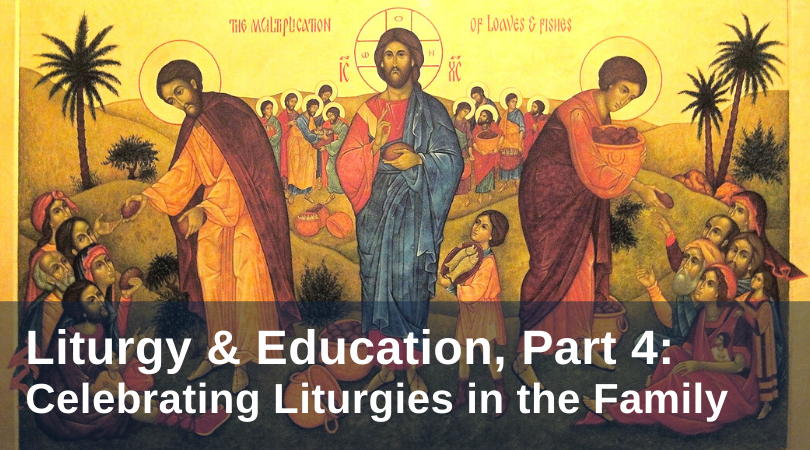
Thus far in this series, we have looked at the intersection of liturgy and education in both the school and the parish. Here, I turn to the last educational milieu we will consider in this series: the family.
Treatments of the family today trend in one of two directions.
The first is an overly romanticized account of the domestic Church, one in which perfectly dressed devoted children and doting parents kneel in domestic bliss before their home altar. This account of the family ignores the difficulties of family life, taking up a romantic vision that is untrue for most families.
The second is to dismiss any discussion of the family at all as unimportant to the Gospel. Christ’s gift of love unto the end destroys our concern with natural relationships. Yes, men and women get married. Women give birth to children, dads care for these kids. But these relationships are less fundamental to the human identity of a Christian than the broader community of the Church. The nuclear family is really nothing more than invention of the late-nineteenth century, and it would be better for us to leave it behind.
Both accounts are fundamentally deficient, ironically in the same way. They both ignore the educational role the family has. The family, lived in the space between birth and death, humanizes this passage of time. Life is not a Hallmark greeting card, nor are families. In families, there are miscarriages, infertility, infidelity, boredom, exhaustion, even violence. This is life for human beings, living in a fallen world. To pass over this, to focus on a romanticized family, is to do life itself injustice.
Yet, families do exist. Even imperfect families form children to live from birth to death, to provide hope even in sorrow. These are not replaceable relationships. A child has a mother and a father precisely because of the intimacy of care that these parents offer. The mother, if she can, feeds the child from her own breast. The father spends long nights awake with the child. The children learn what love consists of, what solidarity involves from parents and siblings. These relationships matter, are irreplaceable, because of their immediacy.
The family can live out this unique vocation, avoiding romanticization, through orienting itself to liturgical prayer. Once more, liturgical prayer is the glorification of God and the sanctification of men and women.
The family is not made simply to spend money, to consume and produce goods. Rather, the family as the domestic Church is made to adore the living God. This adoration is learned in the parish, through participation in the liturgy, and it is further made incarnate in the home. The family that begins meals with prayer, that orders its week toward Sunday worship, that marks time through the liturgical year, is forming husbands, wives, and kids in the art of gratitude.
And yet, the liturgy is also providing an education for the whole family, showing how to sanctify every dimension of human life. The birth of a new child is celebrated not only in the domestic sphere but through Baptism. The death of a beloved grandparent is given shape through the funeral rites. Everything within the family may be blessed, offered back to God, in a Eucharistic sacrifice.
This family, of course, is necessarily in relationship to the Church and to neighbor. The family cannot be closed in on itself. Families include friendships, communion with those who are not kin. These friendships are not interruptions of an otherwise bucolic familial existence. Instead, they are the logical consequence of those formed by domestic prayer.
From the hearth, we are led to the heart of the world, to enter friendship with the whole human family.
The family, for this reason, does not need quaint, domesticized versions of prayer. Instead, the family needs the full liturgical life of the Church, a celebration of the tender mercy of the crucified and risen Lord. The family needs Psalms, the Church’s best hymns, the Rosary, the Sacred Heart, everything that has sustained families throughout Christian history.
Anything less, and we will continue to have romanticized families more interested in the idolatry of domestic bliss and less concerned about the Eucharistic transformation of culture itself.
Like what you read? Submit your email below to have our newest blogs delivered directly to your inbox each week.
Featured image: New Skete, Multiplication of the Loaves and Fishes by Sr. Patricia Reid, RSCJ; courtesy of Jim Forest via flickr; CC-BY-NC-ND-2.0.


